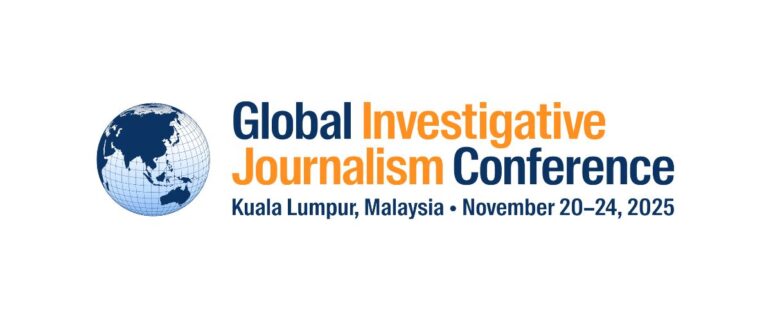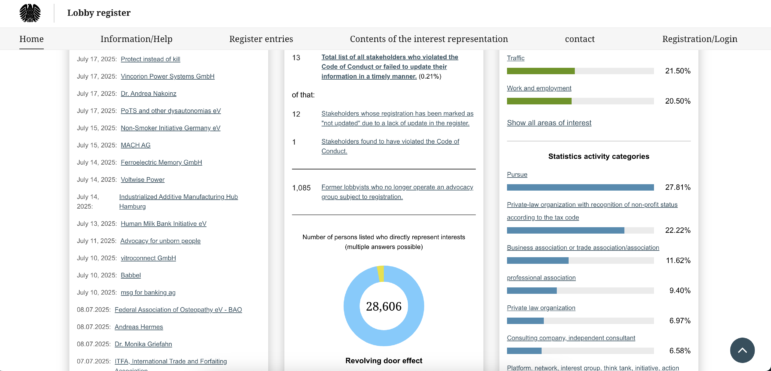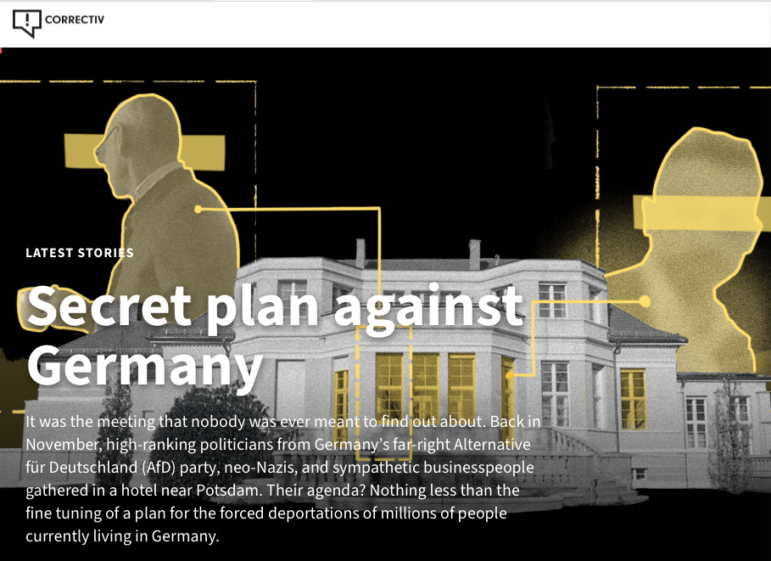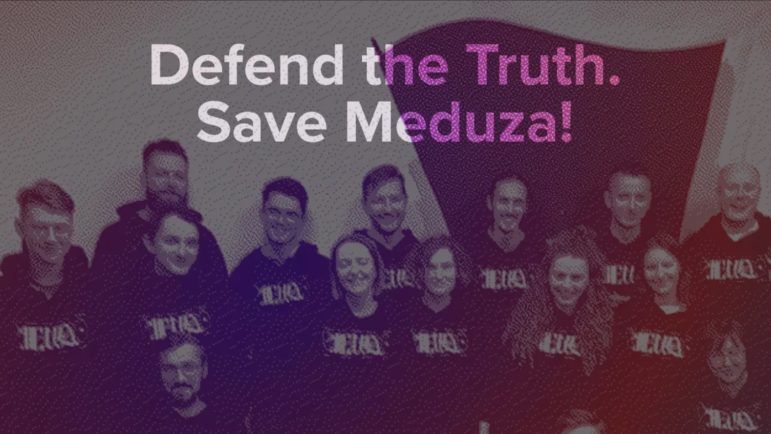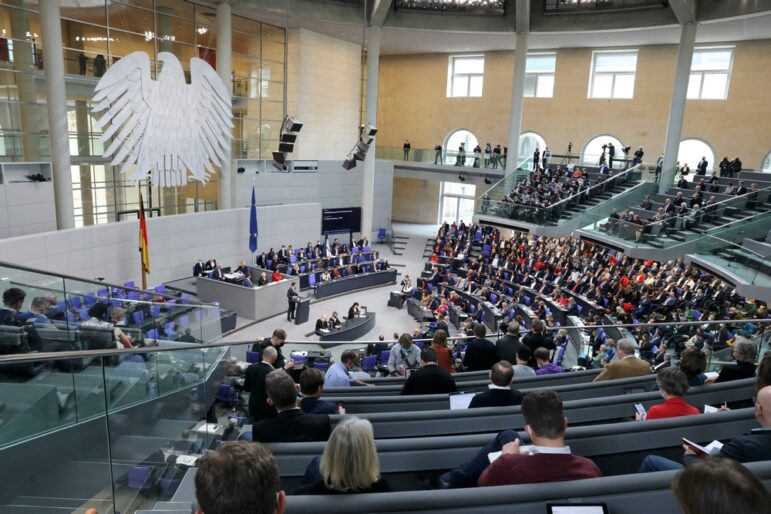

Germany's Bundestag parliament, Berlin. Image: Shutterstock
How to Use Germany’s New Lobby Register as an Investigative Tool
Thanks to significant reforms initiated during Germany’s previous government (the so-called “traffic light coalition”), there is now more information publicly available than ever before related to lobbying at the country’s federal government level — encompassing the money, organizations, and individuals that influence policy on behalf of special interests.
Germany introduced its first federal lobbying act on January 1, 2022, which established the Bundestag (parliament) lobby register — a public database. In response to calls for increased transparency, a January 2024 reform of the lobbying act expanded the details lobbyists are required to disclose.
The “new” lobby register has already proven to be a “data treasure-chest,” according to Timo Lange and Aurel Eschmann of the Cologne-based nonprofit, LobbyControl. Founded in 2005, LobbyControl investigates lobbying practices and promotes political transparency in Germany and the European Union. At the 2025 Netzwerk Recherche conference in Hamburg, Lange and Eschmann shared their insights on navigating the beefed-up resource and the stories journalists can find in the data.
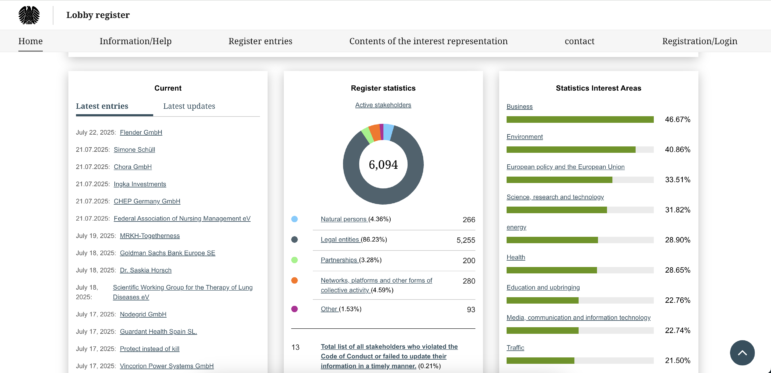
As of June 2025, just over 6,000 lobbying entities had registered details in Germany’s lobby register. Image: Screenshot, Lobbyregister.de
Under Germany’s overhauled Lobbying Act, any representatives of interests are required to register a range of information, and there are now harsher penalties for non-compliance, such as sanctions and fines for those who don’t register or don’t disclose pertinent details.
Lange notes that, compared to the rest of the world, the German lobbying register is “quite special… You find things there that you wouldn’t find in most countries at all,” he said.
Although it does lack information about who exactly is meeting with whom, the register contains a trove of other data.
“We see a whole lot of other things, especially regarding the financing of lobby organizations, associations, and clients,” added Lange. There is information about lobby agencies — who has commissioned them and for what purpose; the subject and objectives of interests; which sectors have the largest annual expenditure on lobbying (the insurance and auto industries); and which lobbyists have recently been in government (listed on the register dashboard as the “revolving door effect”).
Powerful Search Filters
The information on the lobbying objectives in the register grows daily, Lange noted, and it is all fully searchable by text and keywords. One could search for a specific law to see positions and objectives of lobbying groups for and against it; by person, by subject, or by sector. Since June 2025, it has also been possible to register an account and opt to get notifications when information is entered or updated, allowing the public (and investigative journalists) to stay informed about a lobbying group’s activities or relevant laws.
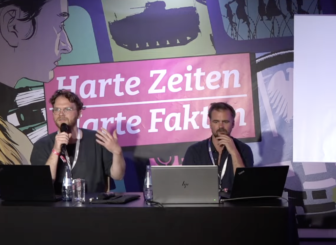
Aurel Eschmann (left) and Timo Lange of the Cologne-based nonprofit, LobbyControl, explained how to use Germany’s lobby register at the 2025 Netwerk Recherche conference in Hamburg. Image: Screenshot, TIDETv, YouTube
There is also what Lange called a “mighty” filter function — including one that shows which lobby groups receive funding from third countries, or which ones lobby on behalf of cities. Taking one example to demonstrate what the register can tell us about one group, Lange cited Nuklearia — an association registered as a nonprofit that promotes a return to nuclear energy. Nuklearia has been striving for years to obtain official recognition as an environmental association to advance its cause, which would give it certain rights like being able to officially weigh in on controversial projects and to bring lawsuits for administrative decisions to be legally reviewed.
The lobby register doesn’t just tell us how many people are involved with Nuklearia, but which laws it seeks to influence, a breakdown of how it’s funded (corporation or private sources), its annual expenditures, and which of its lobbyists has recently served in government.
Individuals representing the interests of an organization are also required to list which organizations and associations of which they, in turn, are members. This is valuable information, Lange explained, because those organizations don’t necessarily always provide information about their membership — and, in this way, you can reverse engineer data about a lobbyist’s ties.
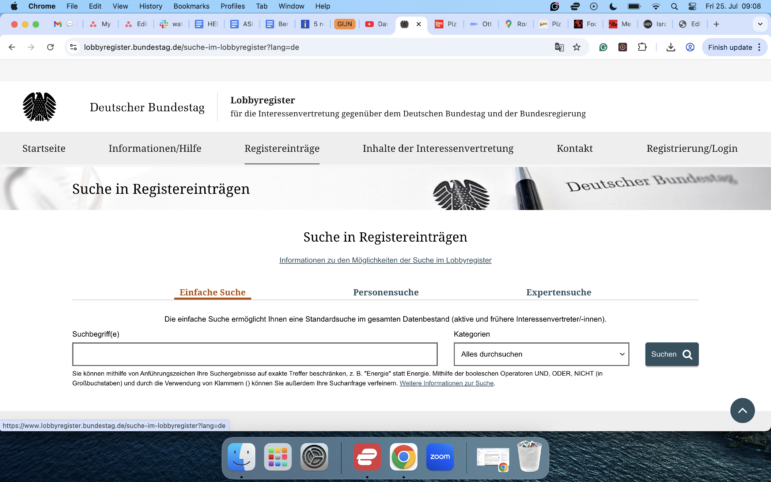
Some search categories in the lobby register database — simple, by person, or by expert. Image: Screenshot, Lobbyregister.de
Alcohol Lobbying
Lange and Eshmann cited their case studies for using the lobby data for stories, such as one involving the German brewers’ association, which, along with the wine lobby and the schnapps lobby, seeks to prevent bans or regulations on advertising alcoholic drinks.
“They act together, you can see that quite well in the lobby register. The entries are just completely copy-pasted in the self-description,” said Eschmann.
One of these lobbying groups’ principal actions is awareness campaigns for “conscious” or responsible alcohol consumption — including advertising campaigns for non-alcoholic beers. Eschmann explained that these are often strategies for drinks companies to argue that they are addressing alcohol’s health risks — in the hope of avoiding stricter regulations on advertising.
“But we happened to notice while researching that — when you look [in the register] at how they lobby the Ministry of Health — there is a statement they sent to [former health minister] Karl Lauterbach, in which they present the argument of responsible consumption,” said Eschmann.
The brewer’s association lobby statement specifically countered recent Ministry of Health guidance that even small amounts of alcohol can be harmful to health, he explained. “In this statement, it is basically written, ‘No, that’s not how it works — you don’t differentiate between alcohol abuse and responsible consumption,’” said Eschmann. The association urged the health ministry to amend the statement accordingly.
“That was already quite an interesting point because we weren’t aware of it,” said Eschmann. “We had assessed this [responsible drinking] public campaign a bit differently. We thought it was a purely public strategy, but it was also a communication strategy against the politics… That was new information.”
‘Exciting’ Layouts, Details, and Omissions
Sometimes it’s not just the data in the register that is interesting to journalists. Eschmann noted the “exciting” layout of an expert opinion letter to the government from the Federal Association of the German Security and Defense Industries (BDSV) — as part of the industry’s long-held ambition to get arms and defense assets declared “sustainable.”
They wanted to achieve this not by reducing carbon dioxide (CO₂) emissions or becoming “greener,” explained Eschmann. Their principal strategy had been to simply state that one cannot undertake any sustainability projects if one cannot defend oneself.
A letter on behalf of this campaign, on the subject of laws regulating the financing of defense companies, argued for the following clause — from a European Commission joint communication — to be integrated into EU guidelines for private banks related to financing the defence industry: “[W]ith the exception of weapons banned by international treaties, the defence industry ‘enhances sustainability due to its inherent contribution to the protection of our way of life.’”
It was the letter’s visual flourish that caught Eschmann’s eye — a letter signature featuring abstract shapes in the colors of the German flag, adorning the phrase “Security is the mother of all sustainability.” This layout provides insight into the themes the campaign chose to emphasize.
The Devil in the Details
There are also stories to be found in the specific details listed in lobbying objectives. This is how, for instance, Eschmann noticed that the contents of a paper from Working Group 15 — known as the AG 15, which focused on the government’s climate and energy policy — were remarkably similar to the lobbying objectives the German Association for Natural Gas, Petroleum and Geoenergy (BVEG) declared.
In the interests register under “Carbon Management,” the BVEG wishlist included, among other items, the commercial use of carbon capture and storage; ratification of the London Protocol — the legal framework for the safe injection and storage of carbon dioxide in sub-seabed geological formations; and the storage of carbon dioxide offshore and onshore.
With help from materials prepared by FragDenStaat (“ask the state”) — a German freedom of information platform — Eschmann said the AG 15 working paper contained some of the same phrases and objectives provided to the lobby register by the BVEG.
Clandestine Anti-Abortion Influence
To demonstrate the lobby register’s search function, Eschmann cited his research into lobbying related to Germany’s abortion law.
“I asked myself, who is actually lobbying for the maintenance of paragraph 218 of the German Penal Code in its current form,” he said. (Paragraph 218 of the German penal code criminalizes abortion, but abortions up until the 12th week of pregnancy are nonpunishable on condition of mandatory counseling.) “So I entered that [into the search function] and you can see there is quite a lot there. And it struck me that there really isn’t anyone in favor of keeping this, and that didn’t quite match my anecdotal idea of how much lobbying pressure was actually behind it.”
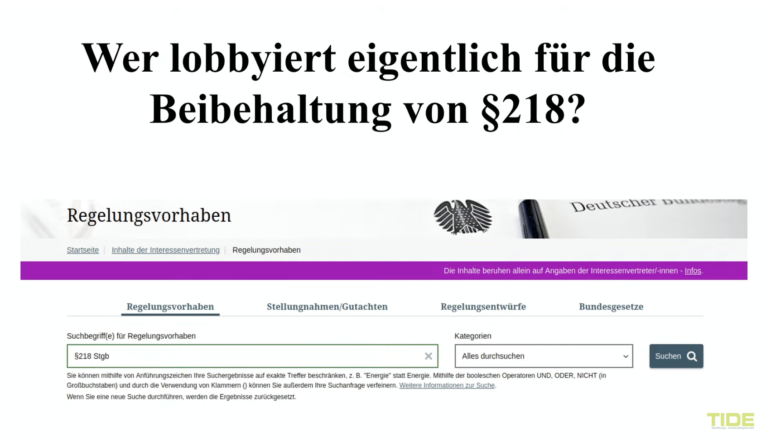
Searching by Paragraph 218 of the German penal code — which criminalizes abortion — yields information about related lobbying for or against amending the law. Image: Screenshot, YouTube, TIDETv
“I took that as an opportunity to look into who is actually participating in the March for Life, all these organizations. I compiled them, and then I passed that on to [public broadcaster] NDR.”
NDR continued investigating and was able to prove that several anti-abortion organizations involved in March for Life [anti-abortion rallies] were indeed contacting politicians, effectively in secret, among other goals, to stop the legalization of abortion. Following the investigation, the organizations had to register themselves.
“Now, the Federal Association for Life Rights is involved. One can initially ask: ‘OK, what purpose does it serve that they are registered?’ The interesting thing [to know] is, of course, the network that finances them. They have to note their financial contributions in the lobby register,” said Eschmann. But the Federal Association for Life Rights has not made financial disclosures, he pointed out. “They simply state €0, which is not credible,” he added.
“This lobby, or sector, deliberately excludes itself from this registration in order to conceal funding sources,” said Eschmann. Under the new rules and the register, organizations involved in this lobbying effort — and the individuals, such as doctors, who play “double roles” by offering purportedly impartial medical opinions on the issue but have kept opaque their connection to “pro-life” networks — must be more transparent. It’s the start of a long process, but it’s an important step, notes Eschmann.
Eschmann pointed out two things to keep in mind when investigating lobbying stories. The first is that it’s always worthwhile to enter something related to a legislative proposal in the context search to see what comes up.
“I do this all the time,” he said. “It was also quite interesting with Germany’s debt brake (the constitutional rule limiting government borrowing that was eased to allow increased defense spending), to find out who is actually in favor of maintaining it and which companies are lobbying for it. There aren’t that many, but it makes for a very interesting composition.”
The second thing that a journalist should keep in mind is that non-registration in the lobby register is a valid reason for reporting. Here is a lobbyist who hasn’t registered as a lobbyist is already a story of public interest, he pointed out.
“It is often forgotten what the power dynamics of our society are,” he said. The lobby register, he added, can show us the 100 organizations that really have — and spend — the most money fighting for the interests of industries, companies, or individuals.
Watch the full Netzwerk Recherche panel below.
 Alexa van Sickle is a journalist and editor with experience across digital and print journalism, publishing, and international think tanks and nonprofits. Before joining GIJN, she was senior editor and podcast producer for the award-winning foreign correspondence and travel magazine, Roads & Kingdoms.
Alexa van Sickle is a journalist and editor with experience across digital and print journalism, publishing, and international think tanks and nonprofits. Before joining GIJN, she was senior editor and podcast producer for the award-winning foreign correspondence and travel magazine, Roads & Kingdoms.



